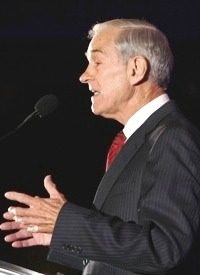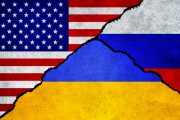
In a speech before the House of Representatives on April 22, Rep. Ron Paul (R-Texas) voiced opposition to H.R. 2194, the Comprehensive Iran Sanctions, Accountability and Divestment Act, referring to the legislation as “this entire push for war on Iran, however it is disguised.”
Rep. Paul drew parallels between the current push to isolate Iran and the events that led up to the U.S.-led invasion of Iraq in 2003: “Listening to the debate on the Floor on this motion and the underlying bill it feels as if we are back in 2002 all over again: the same falsehoods and distortions used to push the United States into a disastrous and unnecessary one trillion dollar war on Iraq are being trotted out again to lead us to what will likely be an even more disastrous and costly war on Iran. The parallels are astonishing.”
Continuing his speech, Paul was critical of what he described as “scare-mongering,” such as assertions that Iran will have missiles that can hit the United States in one year, and that Iran will soon be able to detonate a nuclear weapon. Asking where we had heard such claims before, Paul cited examples of similarly alarmist warnings issued about Iraq during Saddam Hussein’s rule.
The congressman also noted that Iran, which is a signatory of the Nuclear Non-Proliferation Treaty, has never been found in violation of that treaty. Furthermore, noted Paul, Iran is not capable of enriching uranium to the necessary level to manufacture nuclear weapons. Finally, according to the entire U.S. Intelligence Community, Iran is not currently working on a nuclear weapons program.
In summing up his case, Paul observed that the sanctions proposed in HR 2194, and the blockade of Iran that would be necessary to fully enforce them, are in themselves acts of war according to international law. Therefore, he asserted, a vote for sanctions on Iran is a vote for war against Iran.
This was not the first time that Dr. Paul has spoken out emphatically against imposing sanctions against Iran. He has frequently used his “Texas Straight Talk” column posted on his congressional website to bolster his argument. For example, in his TST column for April 17, 2006, “Sanctions against Iran,” he noted: “Economic sanctions are acts of aggression. Sanctions increase poverty and misery among the very poorest inhabitants of targeted nations, and they breed tremendous resentment against those imposing them. But they rarely hurt the political and economic elites responsible for angering American leaders in the first place.”
Westerners often wonder how radical terrorist organizations such as al-Qaeda so easily recruit committed followers willing to risk their lives to attack us. It is quite likely that the “tremendous resentment” that Rep. Paul attributes to the use of sanctions has played more than a minor role in inciting such fanaticism.
Addressing a Foreign Affairs Committee hearing on October 30, 2009, Rep. Paul spoke out against H.R. 2194, the Iran Refined Petroleum Sanctions Act of 2009. In making his case, Paul noted how our previous interventions into the affairs of other nations have usually backfired. As on case-in-point Paul noted:
When we went into Iraq, there were unintended consequences. There is still no stability there, but one thing for certain… Iraq is a much closer ally of Iran right now. We drove the Iraqis into the hands of the Iranians and there has been an expression here that this is good […], but we still should be concerned about China. Well, if you’re concerned about China, this is the best thing in the world for China. They are motivated. They have already invested in Iran. The production of petroleum products has gone up significantly in Iran, so this is a big motivation for the Iranians to do exactly what you don’t want them to do….
How can we get terrified of a threat from the Iranians? You know, they are a Third World nation, up until recently, they couldn’t even make their own gasoline. But because of our pressure so far, they’re getting quite capable of doing it. We’re driving them into the hands of the Chinese. [The Chinese] have our money. They can control us through the dollar and yet, we’re driving the Chinese into taking over just as we drove the Iraqis to become close allies of the Iranians. I think our policies are deeply flawed.
Rep. Paul’s December 15, 2009 congressional speech against H.R. 2194 demonstrated the value of not only knowing our history, but remembering important lessons drawn from our history:
In the late 1930s and the early 1940s the American people did not want to go into war. But there were some that were maneuvering us into war and they used the argument that you needed an event. So in June of 1941 sanctions were put against Japan, incidentally and ironically to prohibit oil products from going into Japan. Within 6 months there was the bombing of Pearl Harbor.
Excerpts from an article published by Wikipedia help us understand some of the circumstances to which Dr. Paul referred:
In an effort to discourage Japanese militarism, Western powers including Australia, the United States, Britain, and the Dutch government in exile, which controlled the petroleum-rich Netherlands East Indies, stopped selling iron ore, steel and oil to Japan, denying it the raw materials needed to continue its activities in China and French Indochina. In Japan, the government and nationalists viewed these embargoes as acts of aggression; imported oil made up about 80% of domestic consumption, without which Japan’s economy, let alone its military, would grind to a halt. The Japanese media, influenced by military propagandists, began to refer to the embargoes as the "ABCD ("American-British-Chinese-Dutch") encirclement" or "ABCD line."
Faced with a choice between economic collapse and withdrawal from its recent conquests (with its attendant loss of face), the Japanese Imperial General Headquarters began planning for a war with the western powers in April or May 1941.
In his 1905-1906 work, The Life of Reason, the Spanish philosopher, essayist, poet and novelist George Santayana stated an oft-quoted principle: “Those who cannot learn from history are doomed to repeat it.”
While many Americans have heeded this principle, few of them, unfortunately, have held key positions directing U.S. foreign policy. As a result, our nation has endured the suffering wrought by almost a century of foreign entanglements and pointless wars.
Photo of Rep. Ron Paul at the Southern Republican Leadership Conference in New Orleans, April 10, 2010: AP Images

